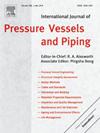Monitoring of abnormal conditions of underground pipelines using fiber-optic vibration sensing and deep learning
IF 3
2区 工程技术
Q2 ENGINEERING, MECHANICAL
International Journal of Pressure Vessels and Piping
Pub Date : 2025-05-17
DOI:10.1016/j.ijpvp.2025.105561
引用次数: 0
Abstract
Pipelines are widely used for the long-distance transportation of fossil fuels and industrial materials. For underground pipelines, the pipeline safety is seriously threatened by various abnormal conditions, including pipe leakage, mechanical impact, earth excavation, third-party intrusion and natural disaster. Therefore, real-time monitoring of abnormal conditions is an effective way to ensure the safety of underground pipelines. In this paper, a fiber-optic vibration sensing system is used to monitor underground pipelines. Deep learning-based methods are proposed for detection and recognition of abnormal pipeline conditions. The detection method integrates a deep scattering network (DSN) with kernel support matrix domain description (KSMDD). The DSN firstly extracts the deep time-frequency features of vibration signals obtained by the fiber-optic sensing system. The KSMDD is then applied on signal feature matrices to define a statistical index for abnormal condition detection. The recognition method integrates a DSN with a gated recurrent unit (GRU) network to extract signal features for recognizing different types of abnormal conditions. Experimental results illustrate that the abnormal condition detection and recognition methods have a false alarm rate of 1 %, a detection rate larger than 99 %, and a recognition accuracy higher than 99 %.
基于光纤振动传感和深度学习的地下管道异常状态监测
管道广泛用于化石燃料和工业材料的长距离运输。对于地下管线来说,管道泄漏、机械冲击、开挖、第三方侵入、自然灾害等各种异常情况严重威胁着管道安全。因此,对地下管线异常状态进行实时监测是保证地下管线安全运行的有效手段。本文采用光纤振动传感系统对地下管线进行监测。提出了基于深度学习的管道异常状态检测与识别方法。该检测方法将深度散射网络(DSN)与核支持矩阵域描述(KSMDD)相结合。DSN首先提取光纤传感系统获得的振动信号的深时频特征。然后将KSMDD应用于信号特征矩阵,定义异常状态检测的统计指标。该方法结合DSN和门控循环单元(GRU)网络提取信号特征,用于识别不同类型的异常情况。实验结果表明,该异常状态检测与识别方法的虚警率为1%,检测率大于99%,识别准确率高于99%。
本文章由计算机程序翻译,如有差异,请以英文原文为准。
求助全文
约1分钟内获得全文
求助全文
来源期刊
CiteScore
5.30
自引率
13.30%
发文量
208
审稿时长
17 months
期刊介绍:
Pressure vessel engineering technology is of importance in many branches of industry. This journal publishes the latest research results and related information on all its associated aspects, with particular emphasis on the structural integrity assessment, maintenance and life extension of pressurised process engineering plants.
The anticipated coverage of the International Journal of Pressure Vessels and Piping ranges from simple mass-produced pressure vessels to large custom-built vessels and tanks. Pressure vessels technology is a developing field, and contributions on the following topics will therefore be welcome:
• Pressure vessel engineering
• Structural integrity assessment
• Design methods
• Codes and standards
• Fabrication and welding
• Materials properties requirements
• Inspection and quality management
• Maintenance and life extension
• Ageing and environmental effects
• Life management
Of particular importance are papers covering aspects of significant practical application which could lead to major improvements in economy, reliability and useful life. While most accepted papers represent the results of original applied research, critical reviews of topical interest by world-leading experts will also appear from time to time.
International Journal of Pressure Vessels and Piping is indispensable reading for engineering professionals involved in the energy, petrochemicals, process plant, transport, aerospace and related industries; for manufacturers of pressure vessels and ancillary equipment; and for academics pursuing research in these areas.

 求助内容:
求助内容: 应助结果提醒方式:
应助结果提醒方式:


